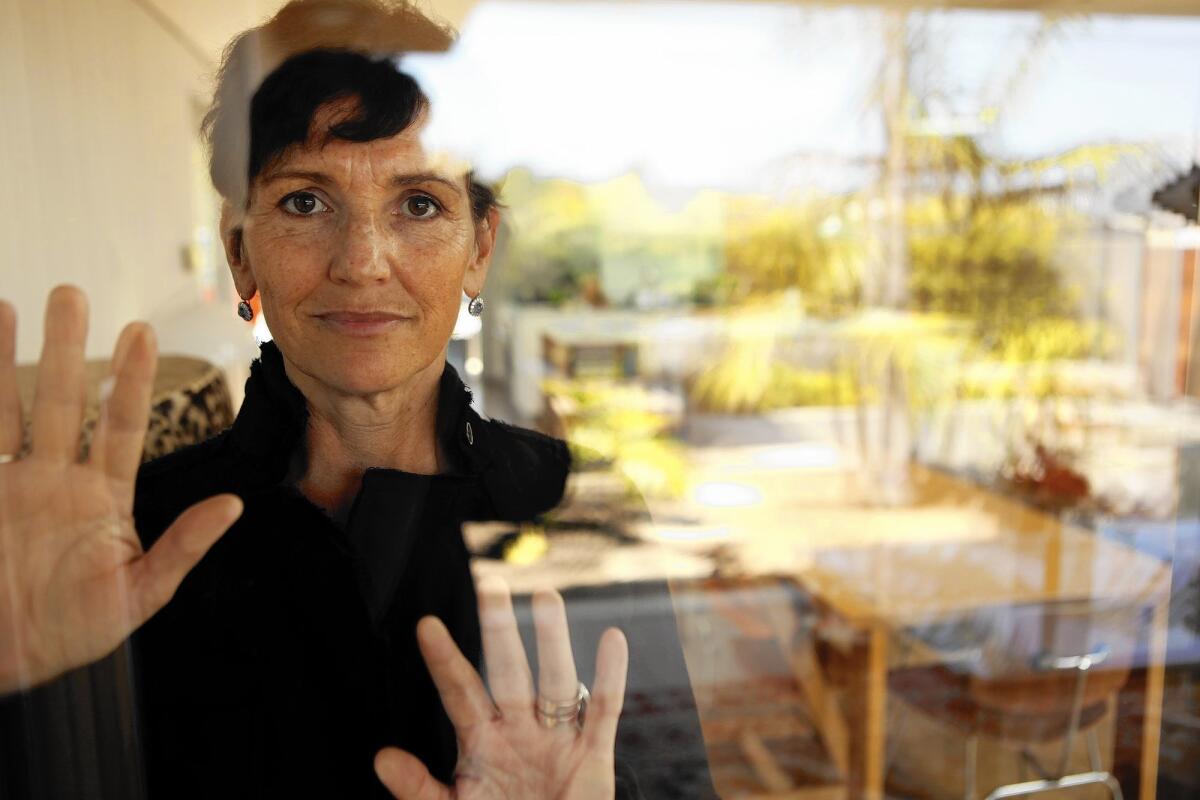Female film directors are on outside looking in, but will ACLU flip the script?

On Valentine’s Day two years ago, film director Maria Giese met with U.S. Equal Employment Opportunity Commission staffers in downtown L.A. to talk about an issue she said was stalling her career — gender discrimination.
Giese, who directed the low-budget feature “Hunger” in 2001 and the British film “When Saturday Comes” in 1996, said the commission representatives were sympathetic to her account of being passed over for directing work on movies and TV shows.
But after three hours of discussion, she said, the agency’s staffers concluded there wasn’t much they could do to help her.
“They had this feeling that the industry was impermeable,” Giese said. “That Hollywood has all the money in the world, amazing legal teams and that they would get trounced. They were all very concerned, but they made it clear there was nothing they could do.”
Her next stop: the American Civil Liberties Union, which listened to Giese’s account and decided to take a closer look. The group spent the next two years examining the issue, soliciting stories from 49 other women directors and compiling data on hiring rates.
That review culminated Tuesday with the ACLU urging the EEOC, the California Department of Fair Employment and Housing and the Office of Federal Contract Compliance Programs to investigate Hollywood’s hiring practices for evidence of gender discrimination.
“What we’ve seen is a very disturbing and compelling picture of long-running systemic discrimination in the film and television industries,” said Melissa Goodman, director of the LGBT, Gender and Reproductive Justice Project at the ACLU of Southern California. “Now is the time for some external oversight and some pressure. Our hope is that they launch an investigation ... identify employers that have the worst patterns and practices and take some action.”
In letters to the state and federal agencies, the ACLU cited a USC study that found that only 1.9% of directors of the top-grossing 100 films of 2013 and 2014 were women. The group also cited a Directors Guild of America report that found women represented just 14% of television directors in 2013 and 2014.
The lack of women directors has long been an acknowledged problem in Hollywood. A Times analysis early this year found that the number of female directors has remained stubbornly low over the last five years, hitting a peak of 8.1% in 2010 but falling to 4.6% last year.
Executives at the major studios say they want to hire more women but that business considerations — including hiring directors with a strong box-office track record — get in the way.
The situation has been exacerbated by the industry’s shift toward big-budget comic book and visual-effects-driven films over the comedies and dramas that have historically provided the few female directing slots.
By demanding an investigation, the ACLU has advanced the debate beyond talk.
“We’re taking it seriously,” said Justine Lisser, a spokeswoman for the EEOC, who added that she could not confirm Giese’s 2013 meeting with agency on grounds that such sessions are confidential. Representatives of the two other agencies said they would also review the ACLU’s request for an investigation.
If authorities ultimately determine that a pattern of discrimination exists, they could take legal action against the studios or seek to mediate a solution aimed at boosting the ranks of female directors.
But the complex process by which films get greenlighted and directors selected could make a legal solution problematic, said Russell Robinson, professor of law at UC Berkeley.
“There are a lot of parties involved in putting together a film,” Robinson said. “If they do bring a lawsuit, one of the challenges of plaintiffs in court would be showing who’s responsible for the hiring decision. The studios will do what’s minimally necessary to avoid government scrutiny.”
Robinson said change is more likely to come from a business incentive, citing the recent success of the Fox show “Empire” and its effect on increased casting of minorities in Hollywood.
Some female directors say they have been reluctant to raise their voices against perceived discrimination for fear of being blacklisted either within the guild or the industry at large.
“We are totally getting punished for speaking out about this,” said Lexi Alexander, who directed the 2008 comic book movie “Punisher: War Zone” and said she has been passed over for television directing jobs in favor of male peers. “Even if there’s noise to hire more women, it’s the quiet ones who will get hired.”
This wouldn’t be the first time government agencies became involved in Hollywood hiring practices.
In the 1960s, the EEOC and the Justice Department found evidence of employment discrimination in Hollywood and reached a settlement with the Assn. of Motion Picture and Television Producers and multiple unions that called for increased recruitment of minorities, but not women specifically.
“The truth is those efforts didn’t really move the dial,” Goodman said. “That’s because the agencies abandoned the project before the job was done.”
In 1983, the Directors Guild of America sued Warner Bros. and Columbia Pictures on behalf of its female and minority members; a judge dismissed the suit in 1985 after the studios argued that the DGA contract gives directors the right to select their own assistants, limiting the studios’ liability for discrimination.
In response to the ACLU action Tuesday, the DGA issued a statement saying that the “lack of network and studio action to hire more women and minority directors is deplorable. The DGA has been a long-standing advocate pressuring the industry to do the right thing, which is to change their hiring practices and hire more women and minority directors.”
But the statement went on to note that the ACLU “made no effort to contact the DGA concerning the issues raised in its letters. The ACLU’s assertions reflect this lack of investigation as to the Guild, and ignore its efforts to combat discrimination against women directors and to promote the employment of women directors.”
The Motion Picture Assn. of America, the movie studio trade group, declined to comment.
The low hiring rates of female directors persist despite recent success for women behind the camera.
In February, Sam Taylor-Johnson’s “Fifty Shades of Grey” collected $85 million for Universal in its opening weekend, the largest debut for a female director. Ava Duvernay’s “Selma” earned $52 million domestically and was nominated for two Oscars, including best picture.
And this weekend, Elizabeth Banks’ “Pitch Perfect 2” is expected to open to $40 million, according to people familiar with pre-release audience surveys.
But those are still the exceptions, Giese noted.
“It’s not that it’s an unequal playing field,” she said. “There is no playing field at all.”
More to Read
Only good movies
Get the Indie Focus newsletter, Mark Olsen's weekly guide to the world of cinema.
You may occasionally receive promotional content from the Los Angeles Times.







